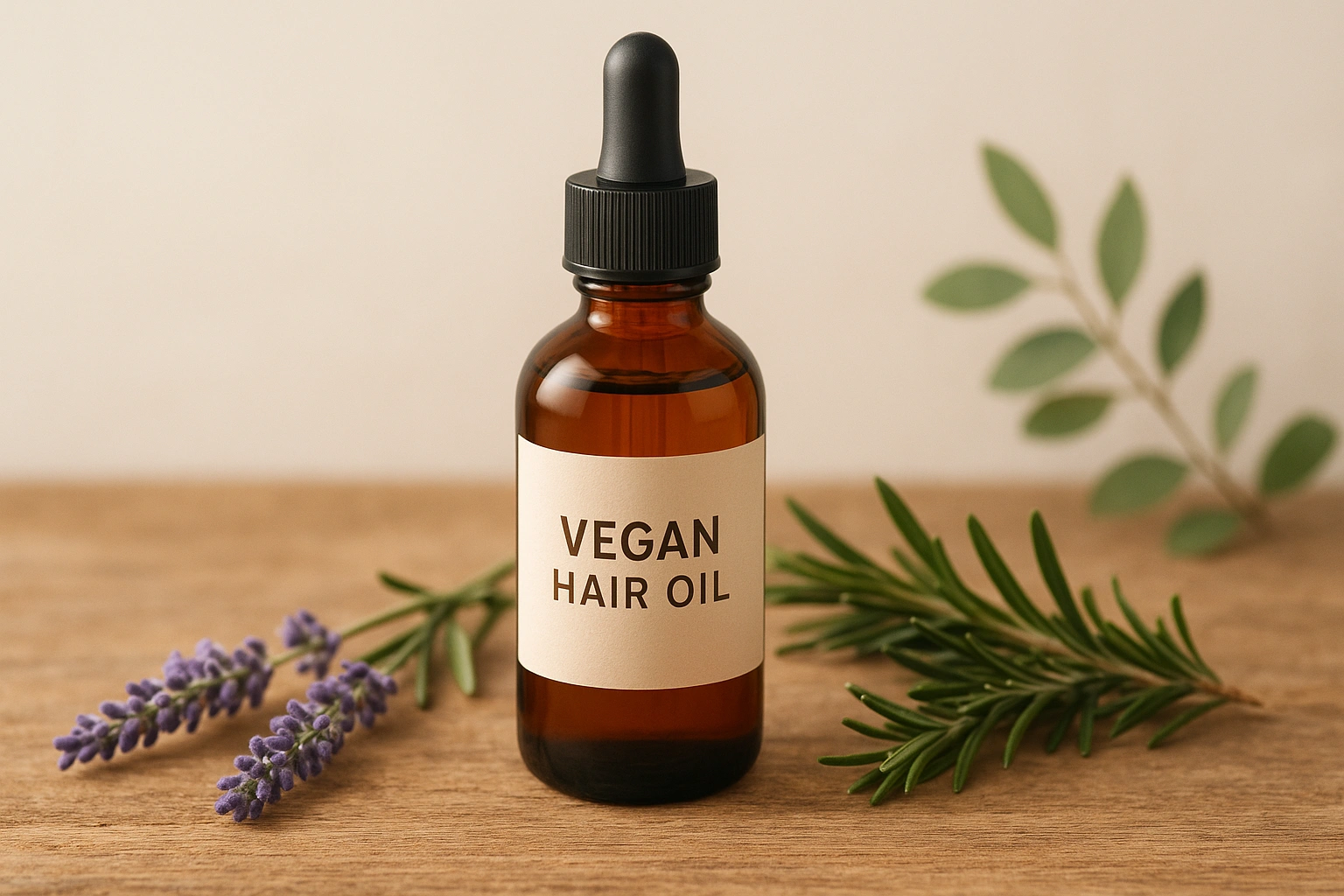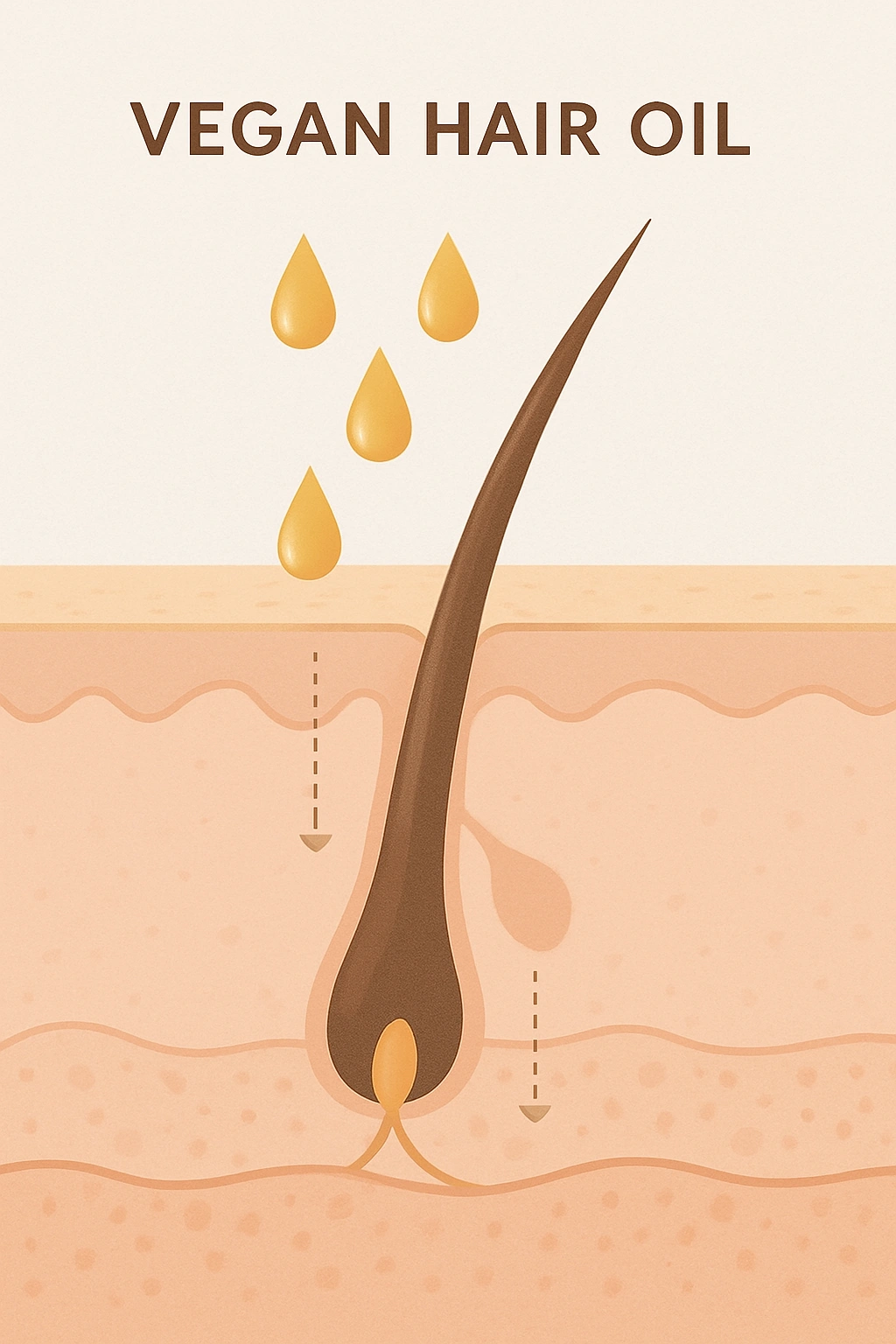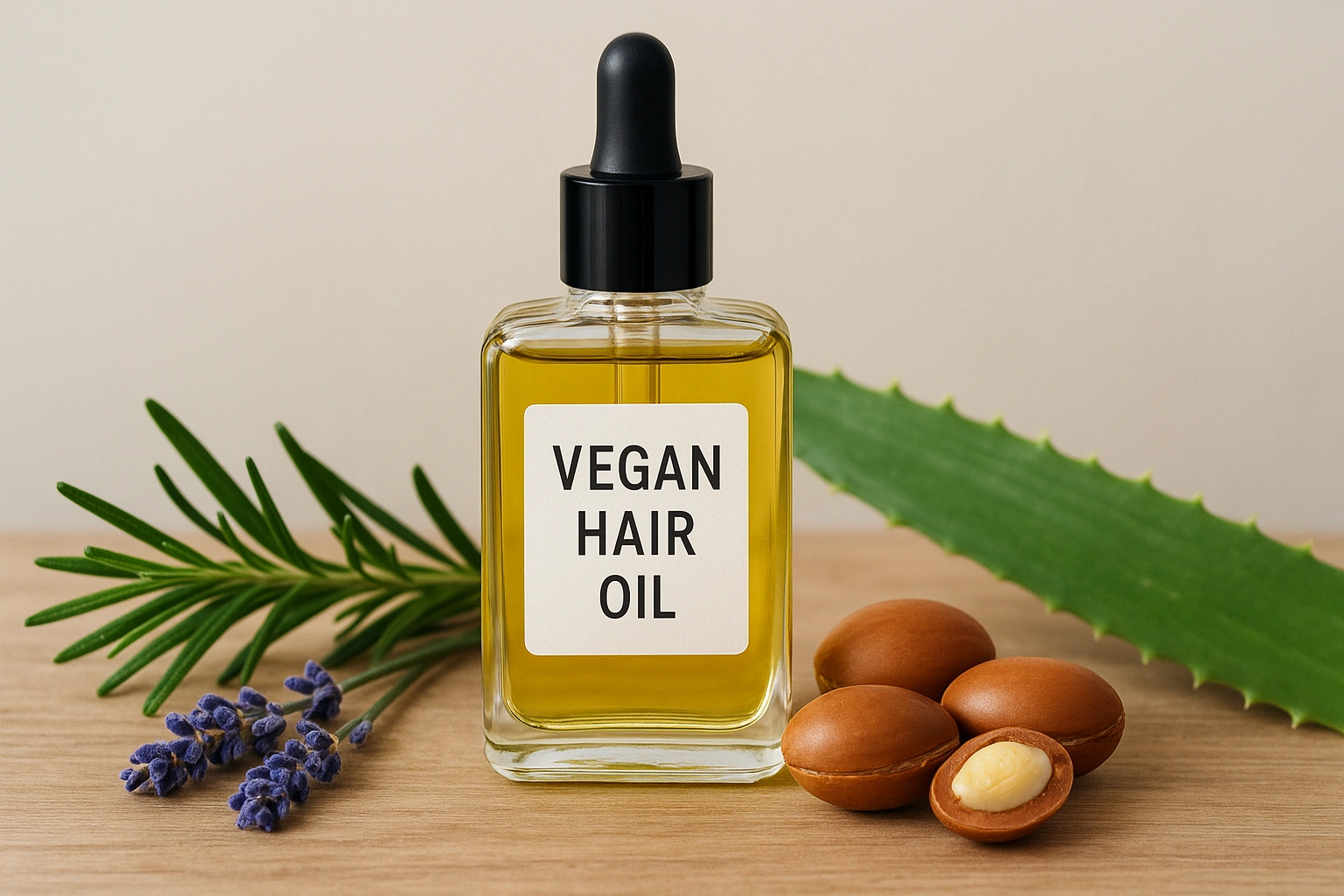- Introduction: Your Journey to Thicker, Healthier Hair Starts Here
- What Exactly Is a Vegan Hair Oil?
- Why Vegan Hair Oil is a Game-Changer for Hair Growth
- How Vegan Hair Oils Work Their Magic: The Science Simplified
- A Real-Life Test: My Experience with a Rosemary & Mint Vegan Hair Oil
- Comparison: Which Vegan Hair Oil is Right for You?
- 7 Common Mistakes to Avoid When Using Hair Oils
- Expert Tips for Maximum Hair Growth
- Frequently Asked Questions (FAQ)
- Conclusion: Embrace the Power of Plants
Introduction: Your Journey to Thicker, Healthier Hair Starts Here
Are you scrolling through social media, envying those with effortlessly thick, luscious hair, and wondering what their secret is? In a world saturated with chemical-laden products promising miracle cures, the answer is often simpler and more natural than you think. Did you know that the global vegan cosmetics market is projected to reach over $25 billion by 2028? This incredible growth isn’t just a trend; it’s a movement towards cleaner, more ethical, and highly effective beauty solutions.
If you’re struggling with hair thinning, slow growth, or lackluster locks, you’ve come to the right place. The secret might just be in harnessing the power of a high-quality vegan hair oil. This guide is your ultimate resource for understanding, choosing, and using plant-based oils to unlock your hair’s true potential. By the end of this article, you will have the knowledge to select the perfect oil for your hair type and a clear routine to achieve the natural, healthy growth you’ve been dreaming of.
What Exactly Is a Vegan Hair Oil?
In simple terms, a vegan hair oil is a hair care product formulated exclusively with plant-derived ingredients. Unlike conventional products that may contain animal byproducts like keratin (from feathers or horns), lanolin (from sheep’s wool), or silk amino acids, vegan options are 100% cruelty-free and plant-powered.
But it’s more than just what they don’t contain. These oils are packed with a potent blend of vitamins, antioxidants, fatty acids, and minerals that your scalp and hair follicles crave. Think of them as superfoods for your hair. As consumers in 2025 become more conscious of ingredients and ethical sourcing, these organic hair growth products are moving from a niche market to a mainstream staple for anyone serious about hair health. According to a report by Grand View Research, this shift is driven by a desire for transparency and sustainable wellness, making vegan hair oil a cornerstone of modern hair care.

Why Vegan Hair Oil is a Game-Changer for Hair Growth
Switching to a vegan hair oil isn’t just an ethical choice; it’s a strategic one for achieving incredible results. The benefits go beyond the surface, targeting the root causes of poor hair health.
It Nourishes the Scalp on a Deeper Level
A healthy scalp is the foundation of healthy hair. Vegan oils like jojoba, argan, and almond are rich in nutrients that penetrate the scalp to:
- Hydrate and Moisturize: They combat dryness and dandruff without clogging pores.
- Balance Sebum Production: Jojoba oil, for instance, mimics the scalp’s natural oils, helping to regulate production for both oily and dry scalps.
- Reduce Inflammation: Ingredients like peppermint and tea tree oil have anti-inflammatory properties that soothe irritation and create an optimal environment for growth.
It Strengthens Hair from Root to Tip
Breakage is a major enemy of long, healthy hair. Plant-based oils fortify the hair shaft, making it more resilient.
- Rich in Fatty Acids: Oils like coconut and avocado are full of omega-3 and omega-6 fatty acids that penetrate the hair cuticle, reducing protein loss and preventing damage.
- Packed with Vitamin E: This powerful antioxidant, found in abundance in argan oil, fights free radical damage and protects hair from environmental stressors like UV rays and pollution.
It Promotes a Healthy, Uninterrupted Growth Cycle
By creating the perfect environment, vegan oils help stimulate dormant follicles and extend the anagen (growth) phase of the hair cycle.
- Boosts Circulation: Massaging oils like rosemary and castor oil into the scalp increases blood flow, delivering more oxygen and nutrients directly to the follicles.
- Provides Essential Nutrients: These oils are a direct source of the vitamins and minerals needed for cellular regeneration and strong hair production. Exploring these kinds of innovative and sustainable solutions is key to long-term health.
How Vegan Hair Oils Work Their Magic: The Science Simplified
The effectiveness of vegan hair oil isn’t magic—it’s science. The molecular structure of these natural oils allows them to work in synergy with your body’s biology.
Here’s a simplified breakdown of the process:
- Application & Massage: When you massage the oil into your scalp, you manually stimulate blood flow. This is the crucial first step that awakens the hair follicles.
- Penetration: The oil’s fatty acids and nutrients penetrate the outer layer of the skin and the hair shaft. Lighter oils (like jojoba) are absorbed quickly to moisturize, while heavier oils (like castor) coat the hair shaft to protect it.
- Follicle Nourishment: Once absorbed, the vitamins (like Biotin and Vitamin E) and minerals feed the hair follicle directly, providing the building blocks for strong keratin production.
- Protection & Sealing: The oil forms a protective barrier on the hair strand, sealing in moisture, reducing frizz, and protecting it from heat and environmental damage.

A Real-Life Test: My Experience with a Rosemary & Mint Vegan Hair Oil
I was always someone who struggled with fine hair that seemed to grow at a snail’s pace. After hearing about the incredible benefits, I decided to commit to a routine using a popular vegan hair oil blend featuring rosemary and mint. For 90 days, I applied it three times a week.
The application was a ritual. I’d part my hair into sections and use the dropper to apply the oil directly to my scalp. Then, I’d spend 5-10 minutes massaging it in before tying my hair up and leaving it in for at least two hours (sometimes overnight).
The initial results were subtle: my scalp felt less itchy, and my hair had a beautiful, healthy sheen. But around the six-week mark, I started noticing dozens of tiny “baby hairs” sprouting along my hairline. By the end of the 90 days, my hair felt noticeably thicker, my ponytail was fuller, and my overall hair fall in the shower had significantly reduced.
| Pros | Cons |
|---|---|
| Noticeably reduced hair fall after 4 weeks. | Requires consistency; results are not overnight. |
| Soothed my dry, itchy scalp immediately. | Can make fine hair look greasy if not washed out properly. |
| New growth was visible along the hairline. | The herbal scent might be strong for some people. |
| Made my hair incredibly soft and shiny. |
Comparison: Which Vegan Hair Oil is Right for You?
Not all oils are created equal. The best one for you depends on your hair type and specific concerns. Here’s a comparison of the top contenders.
| Oil | Key Ingredients | Best For | Pros | Cons |
|---|---|---|---|---|
| Argan Oil | Vitamin E, Omega Fatty Acids, Antioxidants | Dry, Frizzy, Damaged Hair | Lightweight, easily absorbed, adds incredible shine, heat protectant. | Can be expensive, pure forms are rare. |
| Jojoba Oil | Vitamin E, B-Complex Vitamins, Zinc | Oily or Combination Scalps, Dandruff | Mimics scalp’s natural sebum, non-greasy, great for balancing oil production. | May not be heavy enough for extremely coarse or dry hair. |
| Castor Oil | Ricinoleic Acid, Vitamin E, Proteins | Thinning Hair, Slow Growth | Extremely nourishing, thickens hair strands, stimulates blood flow, antibacterial. | Very thick and sticky, can be difficult to wash out. |
| Rosemary Oil | Carnosic Acid, Antioxidants | All types, especially for hair loss | Clinically shown to be as effective as minoxidil for hair growth, stimulates follicles. | Must be diluted with a carrier oil; potent scent. |
| Coconut Oil | Lauric Acid, Saturated Fats | All types, especially for preventing protein loss | Deeply penetrates the hair shaft, prevents breakage, adds moisture and luster. | Can cause protein buildup in some hair types; may clog pores. |
7 Common Mistakes to Avoid When Using Hair Oils
Using a vegan hair oil is simple, but a few common mistakes can prevent you from getting the best results.
- Using Way Too Much Oil: More is not better. A few drops are enough for your entire scalp. Overdoing it will weigh your hair down and make it difficult to wash out.
- Applying Only to the Ends: While the ends need moisture, the real growth magic happens at the scalp. Always prioritize a thorough scalp massage.
- Applying to Dirty Hair: Applying oil to a scalp with days of product buildup and dirt can clog pores and hinder absorption. Apply to relatively clean, dry hair.
- Being Inconsistent: This is the biggest mistake. You won’t see results from using it once a month. Aim for 2-3 times per week for at least 3 months.
- Expecting Overnight Miracles: Hair growth is a slow process. Be patient and trust the routine. It takes time for follicles to be nourished and for new hair to grow.
- Not Patch Testing: Some people can be sensitive to certain essential oils. Always test a small amount on your skin 24 hours before applying it to your entire scalp.
- Using the Wrong Oil for Your Hair Type: Using heavy castor oil on fine, oily hair is a recipe for disaster. Refer to the comparison table to find your perfect match.
Expert Tips for Maximum Hair Growth
Ready to take your oiling routine to the next level? Here are some pro tips.
- Warm It Up: Gently warming the oil before application helps it penetrate the scalp and hair cuticle more effectively.
- Massage, Don’t Rub: Use the pads of your fingers to apply gentle, circular motions. Aggressive rubbing can cause breakage.
- Use the Inversion Method: After applying the oil, flip your head upside down for 2-4 minutes to boost blood flow to the scalp.
- Wrap It Up: Cover your hair with a shower cap or warm towel for 30 minutes after application. The heat opens up the cuticles for deeper absorption.
- Make It a Pre-Poo Treatment: Applying oil before you shampoo (a “pre-poo”) protects your hair from being stripped of its natural oils by harsh sulfates.
- Don’t Forget Your Eyebrows & Lashes: A tiny drop of castor oil on a spoolie can help promote thicker brows and lashes.
- Consistency is Everything: As cybersecurity expert John Smith says, “Consistency is the key to a strong defense.” The same applies to hair care.
“A consistent oiling routine is the number one defense against hair thinning and damage,” says Dr. Anya Sharma, a certified trichologist.
Frequently Asked Questions (FAQ)
Q: Can vegan hair oil regrow hair on bald spots?
A: For conditions like androgenetic alopecia (pattern baldness), vegan oils can help by stimulating follicles that are dormant but not dead. A study published by the National Center for Biotechnology Information (NCBI) found rosemary oil to be a promising natural alternative for stimulating growth. However, they cannot revive dead follicles.
Q: How often should I use a vegan hair oil?
A: For most people, 2-3 times per week is ideal. If you have an extremely dry scalp, you might benefit from more frequent use, while those with oily scalps might stick to once a week.
Q: Will hair oil make my hair greasy?
A: It will if you use too much or don’t wash it out properly. Use a small amount, focus on the scalp, and use a clarifying shampoo to rinse it out completely.
Q: How long does it take to see results?
A: With consistent use, you can expect to see initial results like improved shine and scalp health within a few weeks. Noticeable new growth typically takes 3-6 months.
Q: Can I mix different vegan oils together?
A: Absolutely! Creating your own blend is a great way to get the benefits of multiple oils. A popular combination is a carrier oil like jojoba mixed with a few drops of rosemary and peppermint essential oils.
Q: Is coconut oil a good vegan hair oil for everyone?
A: While popular, coconut oil can be comedogenic (pore-clogging) for some people and can cause protein buildup on low-porosity hair, making it feel stiff. It’s best for those with thick, high-porosity hair.
Conclusion: Embrace the Power of Plants
Navigating the world of hair care can be overwhelming, but the solution to stronger, healthier hair is often found in nature. A high-quality vegan hair oil offers the perfect balance between nourishment and simplicity, making it easier to care for your strands naturally.
Using vegan hair oil is more than just adding another product to your shelf; it’s a commitment to feeding your hair and scalp with pure, effective, and ethically sourced ingredients that truly support long-term health.
By understanding your hair’s needs, choosing the right vegan hair oil, and staying consistent with your routine, you’ll see how vegan hair oil can transform your locks from the inside out, leaving them stronger, shinier, and full of life.
Remember, the journey to luscious hair is a marathon, not a sprint. Be patient, enjoy the ritual, and get ready to see the incredible results that these organic hair growth products can deliver.
What’s your favorite vegan hair oil, or which one are you excited to try? Share your thoughts and experiences in the comments below!
